Watch our Executive Director Chris Coulter at the Munich Security Conference!
Watch our Executive Director at #MSC2026!
Our Library
Explore our publications, from research papers and series to educational materials, covering all aspects of conflict transformation and peace promotion.
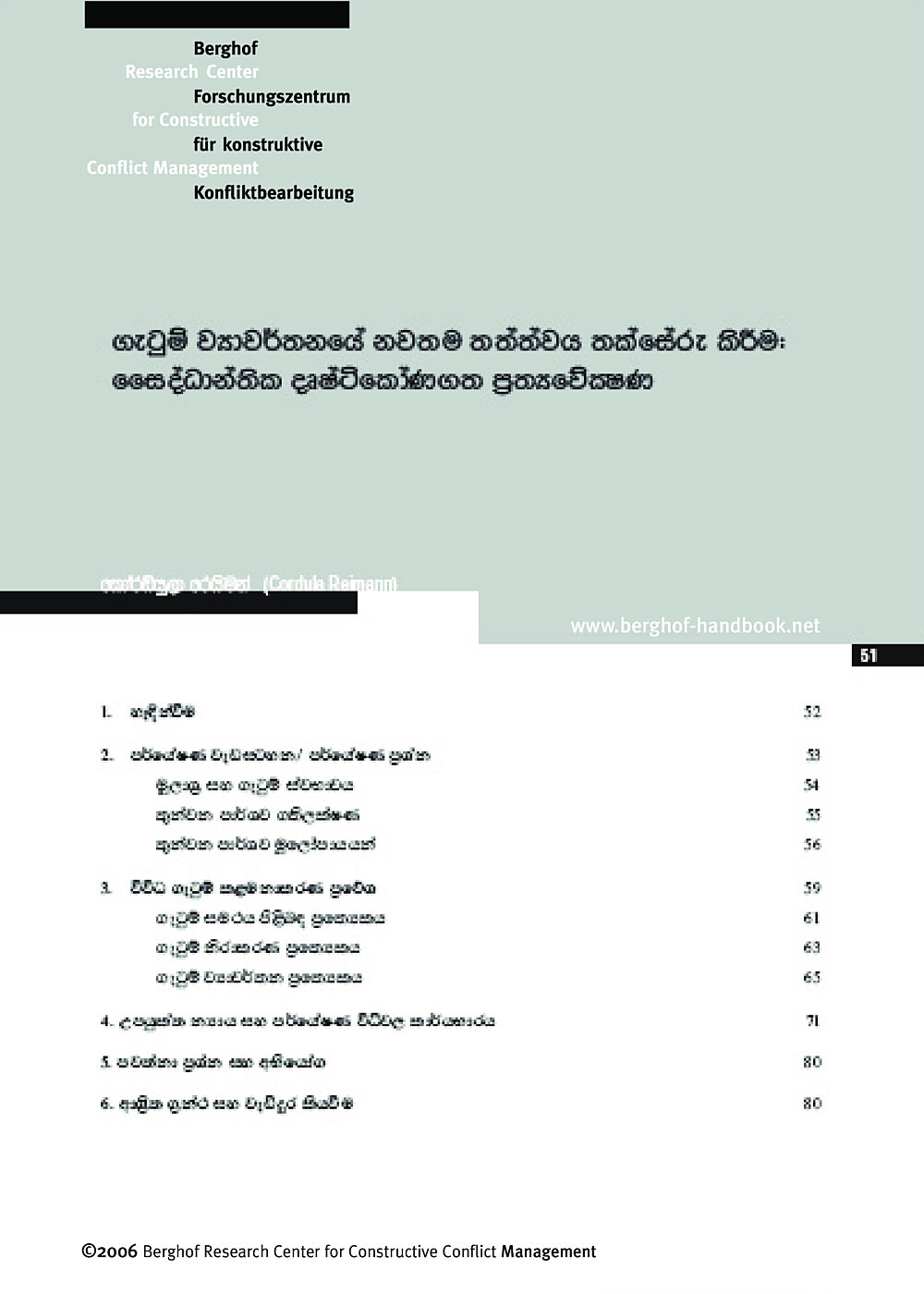
ගැටුම් ව්යවර්තනයේ නවතම තත්ත්වය තක්සේරු කිරීම: සෛද්ධාන්තික දෘෂ්ටිකෝණගත ඵ්රත්යවේක්ෂණHandbook Article
[සාරාංශ යන්ත්රයෙන් පරිවර්තනය කර ඇත] ක්ෂේත්රයේ නවීනතම තත්වය පිළිබඳ පොදු දළ විශ්ලේෂණයක් සහ තාවකාලික අර්ථ නිරූපණයක් ඉදිරිපත් කරයි. කතුවරයා එකිනෙකට වෙනස් ප්රවේශයන් තුනක් හඳුන්වා දෙයි: ගැටුම් නිරාකරණය, ගැටුම් නිරාකරණය සහ ගැටුම් පරිවර්තනය. ඇය ක්ෂේත්රයේ පර්යේෂණ න්යාය පත්රය සහ පර්යේෂණ ප්රශ්න සහ න්යායේ හා ක්රමවේදයේ කාර්යභාරය සමාලෝචනය කරයි. (2004 මුද්රණ සංස්කරණය සඳහා සංශෝධනය කරන ලදි)
- Year2007
- Author(s)Cordula Reimann
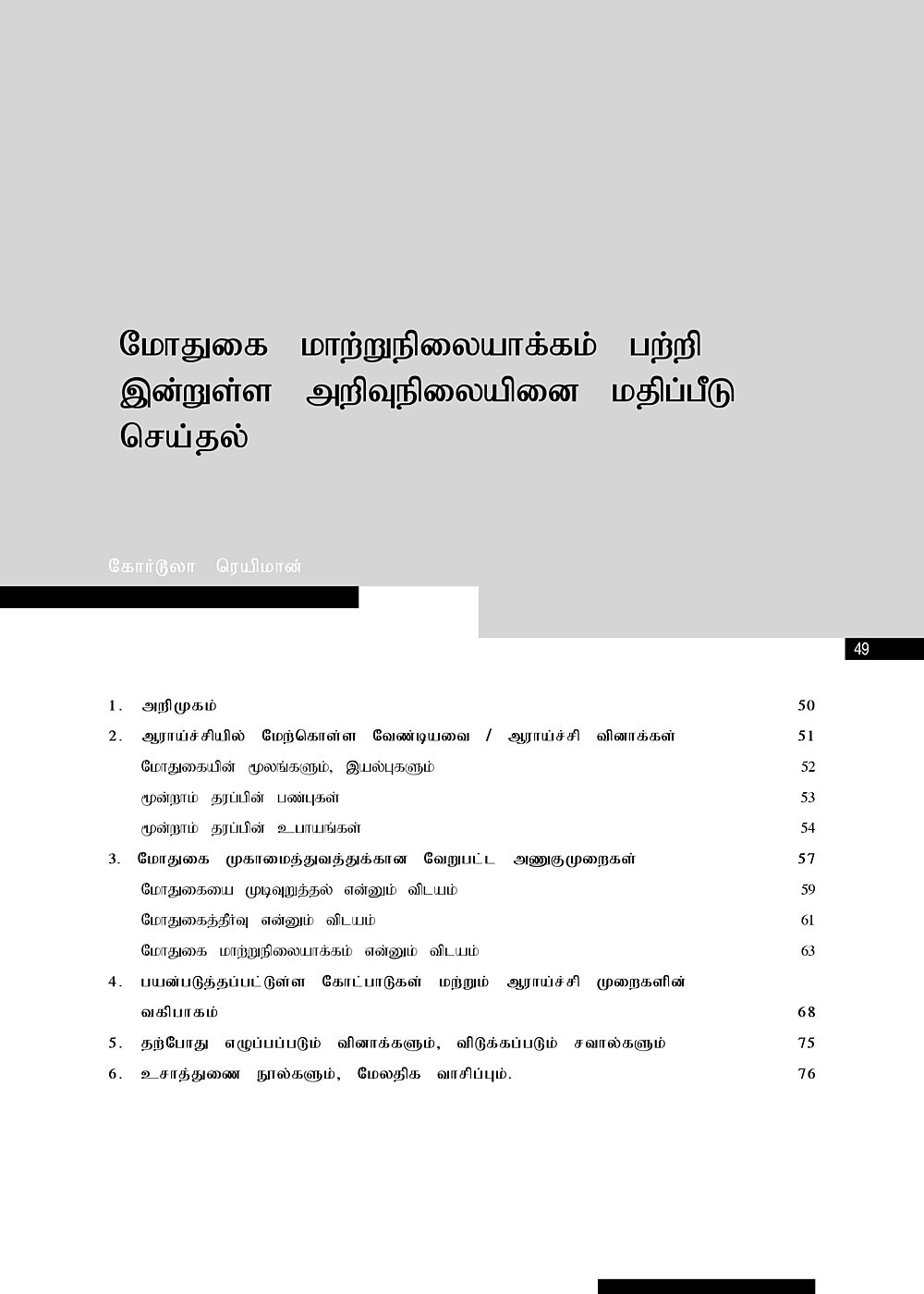
மோதுகை மாற்றுநிலையாக்கம் பற்றி இன்றுள்ள அறிவு நிலையினை மதிப்பீடு செய்தலHandbook Article
[சுருக்கம் இயந்திரம்-மொழிபெயர்க்கப்பட்டுள்ளது] புலத்தில் உள்ள கலையின் நிலை குறித்த பொதுவான கண்ணோட்டத்தையும் தற்காலிக விளக்கத்தையும் வழங்குகிறது. ஆசிரியர் மூன்று தனித்துவமான அணுகுமுறைகளை அறிமுகப்படுத்துகிறார்: மோதல் தீர்வு, மோதல் தீர்வு மற்றும் மோதல் மாற்றம். புலத்தின் ஆராய்ச்சி நிகழ்ச்சி நிரல் மற்றும் ஆராய்ச்சி கேள்விகள் மற்றும் கோட்பாடு மற்றும் முறையின் பங்கு ஆகியவற்றை அவர் மதிப்பாய்வு செய்கிறார். (2004 அச்சு பதிப்பிற்காக திருத்தப்பட்டது)
- Year2007
- Author(s)Cordula Reimann
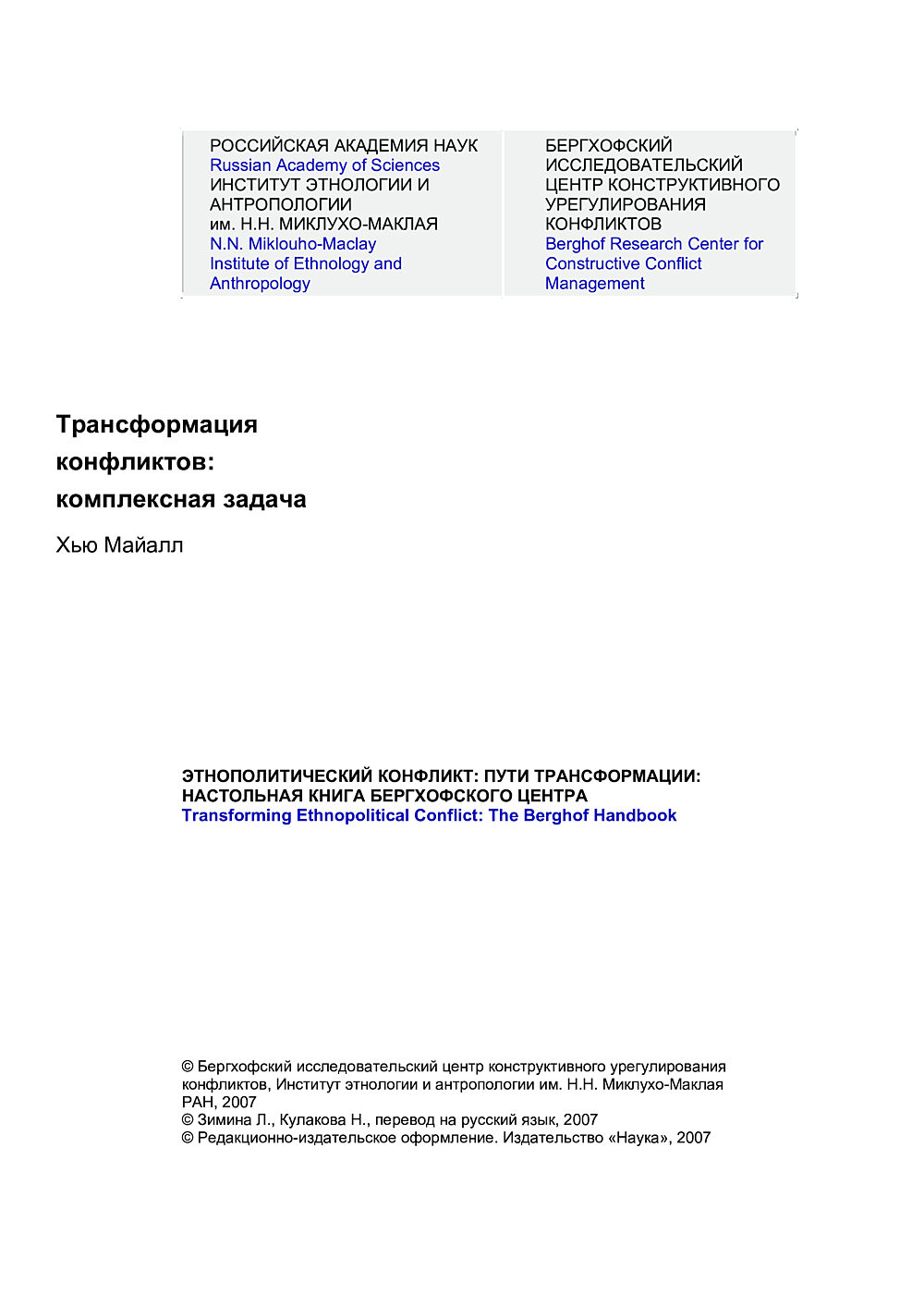
Трансформация конфликтов: комплексная задачаHandbook Article
[Аннотация машинного перевода] Определяет ключевых теоретиков и методы работы. Автор пытается отличить их от теорий и практик разрешения конфликтов и управления конфликтами, утверждая, что трансформация конфликтов во многом опирается на эти более ранние традиции. (переработано для печатного издания 2004 г.)
- Year2007
- Author(s)Hugh Miall

ගැටුම් ව්යවර්තනය: බහුමානක මෙහෙයුමක්Handbook Article
[වියුක්ත යන්ත්ර පරිවර්තනය] ප්රධාන න්යායාචාර්යවරුන් සහ භාවිතයේ ක්රම හඳුනා ගනී. ගැටුම් නිරාකරණය හා ගැටුම් කළමනාකරණය පිළිබඳ න්යායන් හා භාවිතයන්ගෙන් මේවා වෙන්කර හඳුනා ගැනීමට කතුවරයා උත්සාහ කරයි. (2004 මුද්රණ සංස්කරණය සඳහා සංශෝධනය කරන ලදි)
- Year2007
- Author(s)Hugh Miall
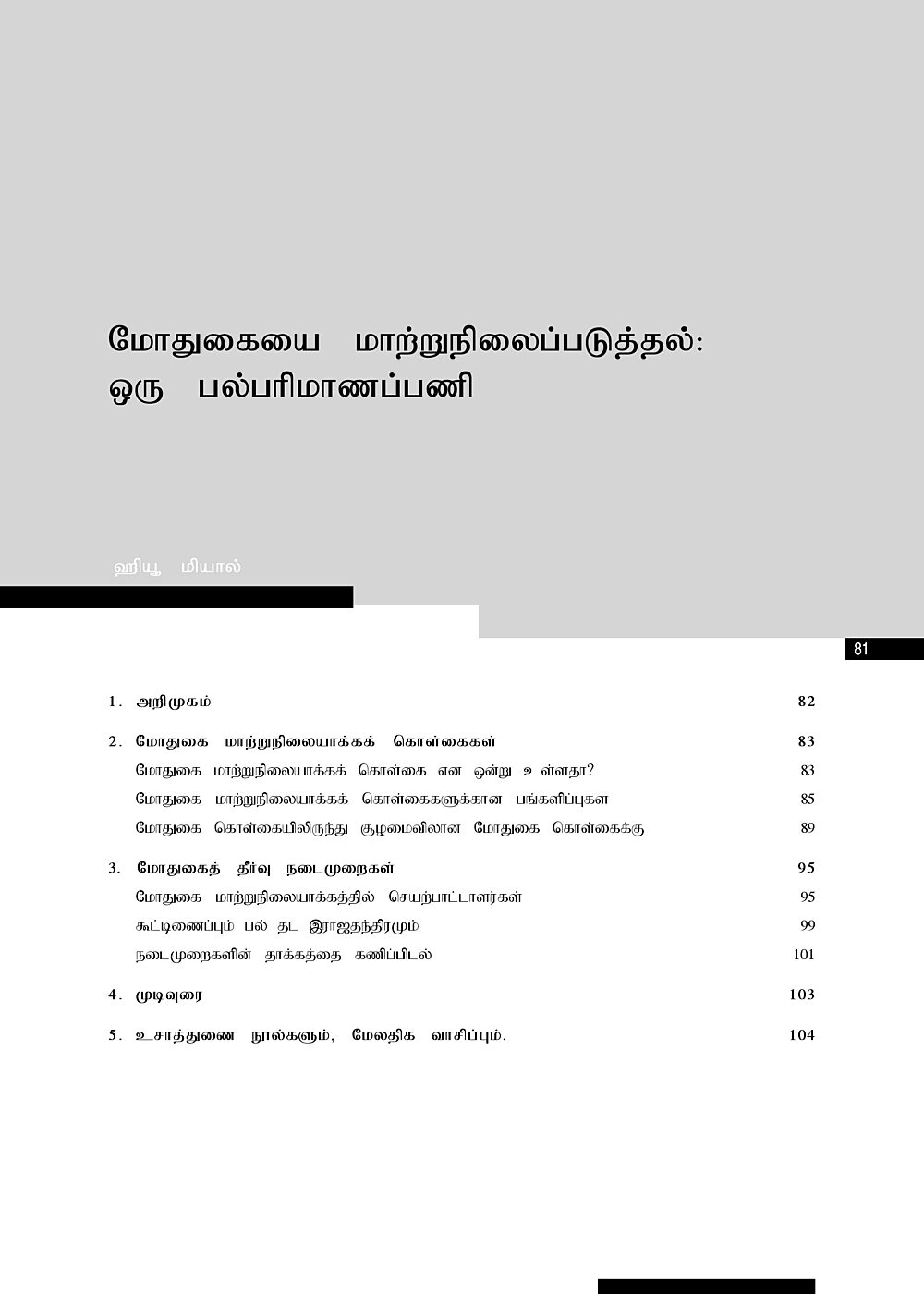
மோதுகையை மாற்றுநிலைப்படுத்தல்: ஒரு பல்பரிமாணப் பணிHandbook Article
[சுருக்கம் இயந்திரத்தால் மொழிபெயர்க்கப்பட்டுள்ளது] முக்கிய கோட்பாட்டாளர்களையும் நடைமுறை முறைகளையும் அடையாளம் காட்டுகிறது. மோதல் தீர்வு மற்றும் மோதல் நிர்வாகத்தின் கோட்பாடுகள் மற்றும் நடைமுறைகளிலிருந்து இவற்றை வேறுபடுத்த ஆசிரியர் முயற்சிக்கிறார், மோதல் மாற்றம் இந்த முந்தைய மரபுகளில் பெரிதும் ஈர்க்கிறது என்று வாதிடுகிறார். (2004 அச்சு பதிப்பிற்காக திருத்தப்பட்டது)
- Year2007
- Author(s)Hugh Miall
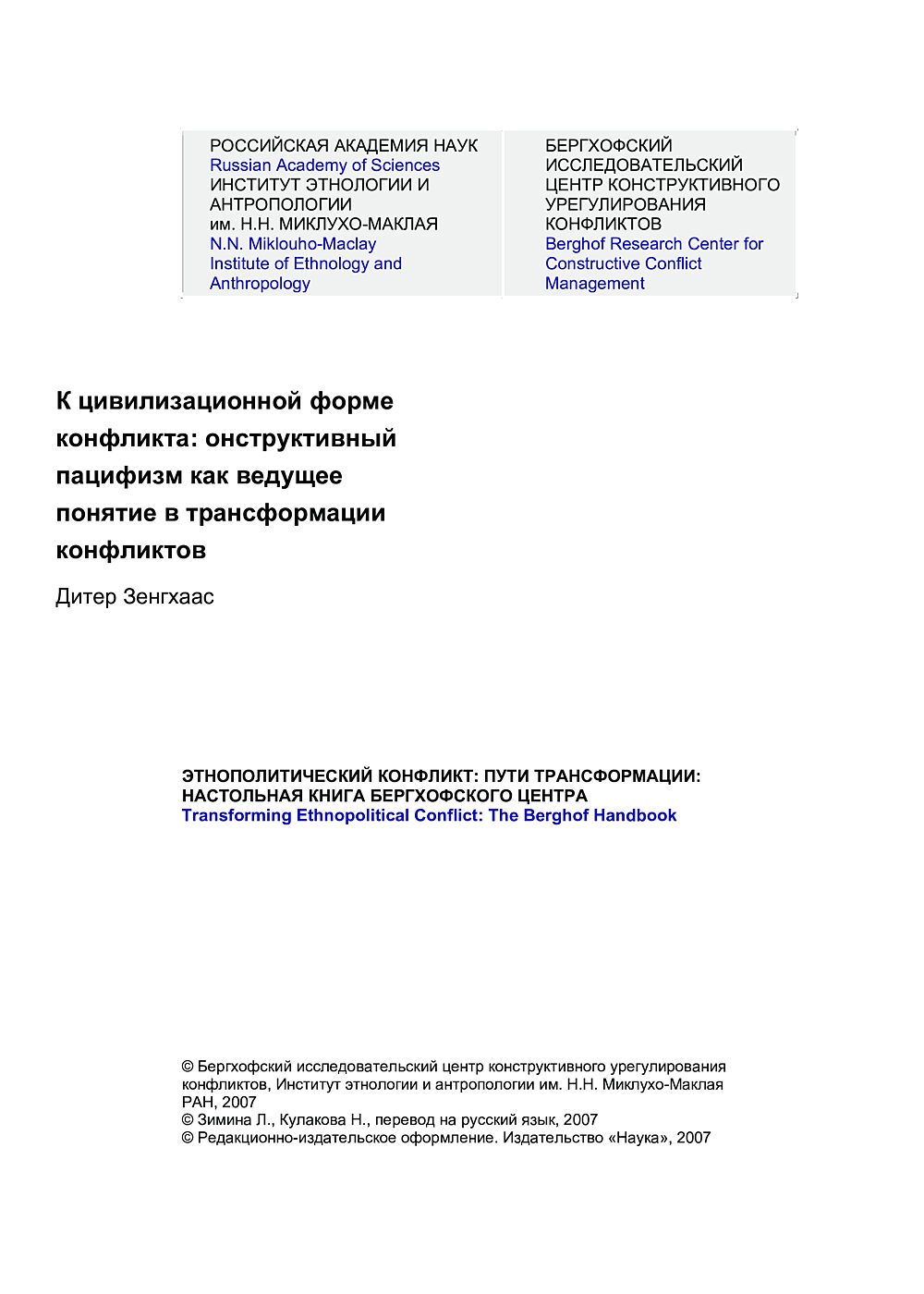
К цивилизационной форме конфликта: онструктивный пацифизм как ведущее понятие в трансформации конфликтовHandbook Article
[Аннотация машинный перевод] Обсуждает теоретические вопросы, касающиеся цивилизованного управления конфликтами. Автор предполагает, что если гражданская или международная война является результатом анархии, то с ней можно справиться только с помощью социального порядка, построенного на национальном, региональном и международном уровнях. Автор представляет модель сложной архитектуры мира - «цивилизационного шестиугольника». (переработано для печатного издания 2004 г.)
- Year2007
- Author(s)Dieter Senghaas
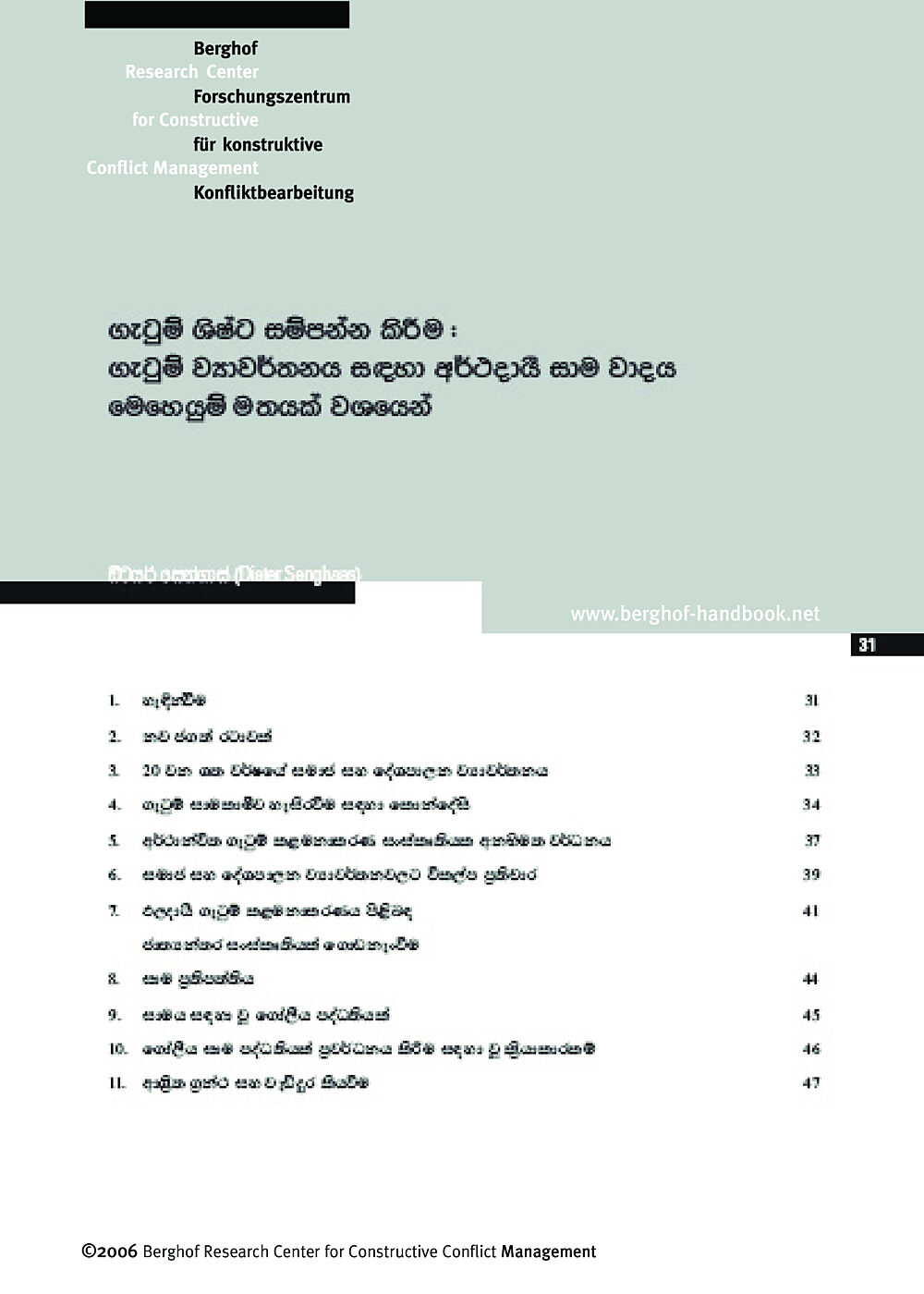
ගැටුම් ශිෂ්ටසම්පන්න කිරීම: ගැටුම් ව්යවර්තනය සඳහා අර්ථදායි සාමවාදය මෙහෙයුම් මතයක් වශයෙන්Handbook Article
[වියුක්ත යන්ත්ර-පරිවර්තනය] ගැටුම් ශිෂ් ized සම්පන්න කළමනාකරණය පිළිබඳ න්යායාත්මක ප්රශ්න සාකච්ඡා කරයි. කතුවරයා යෝජනා කරන්නේ සිවිල් හෝ ජාත්යන්තර යුද්ධය අරාජිකත්වයේ ප්රති result ලයක් නම් එය ආමන්ත්රණය කළ හැක්කේ ජාතික, කලාපීය හා ජාත්යන්තර මට්ටමින් ගොඩනඟන ලද සමාජ පිළිවෙලකට පමණක් බවයි. කතුවරයා සංකීර්ණ සාම ගෘහ නිර්මාණ ශිල්පයේ ආකෘතියක් ඉදිරිපත් කරයි, එනම් “ශිෂ්ටාචාර ෂඩාස්රය”. (2004 මුද්රණ සංස්කරණය සඳහා සංශෝධනය කරන ලදි)
- Year2007
- Author(s)Dieter Senghaas
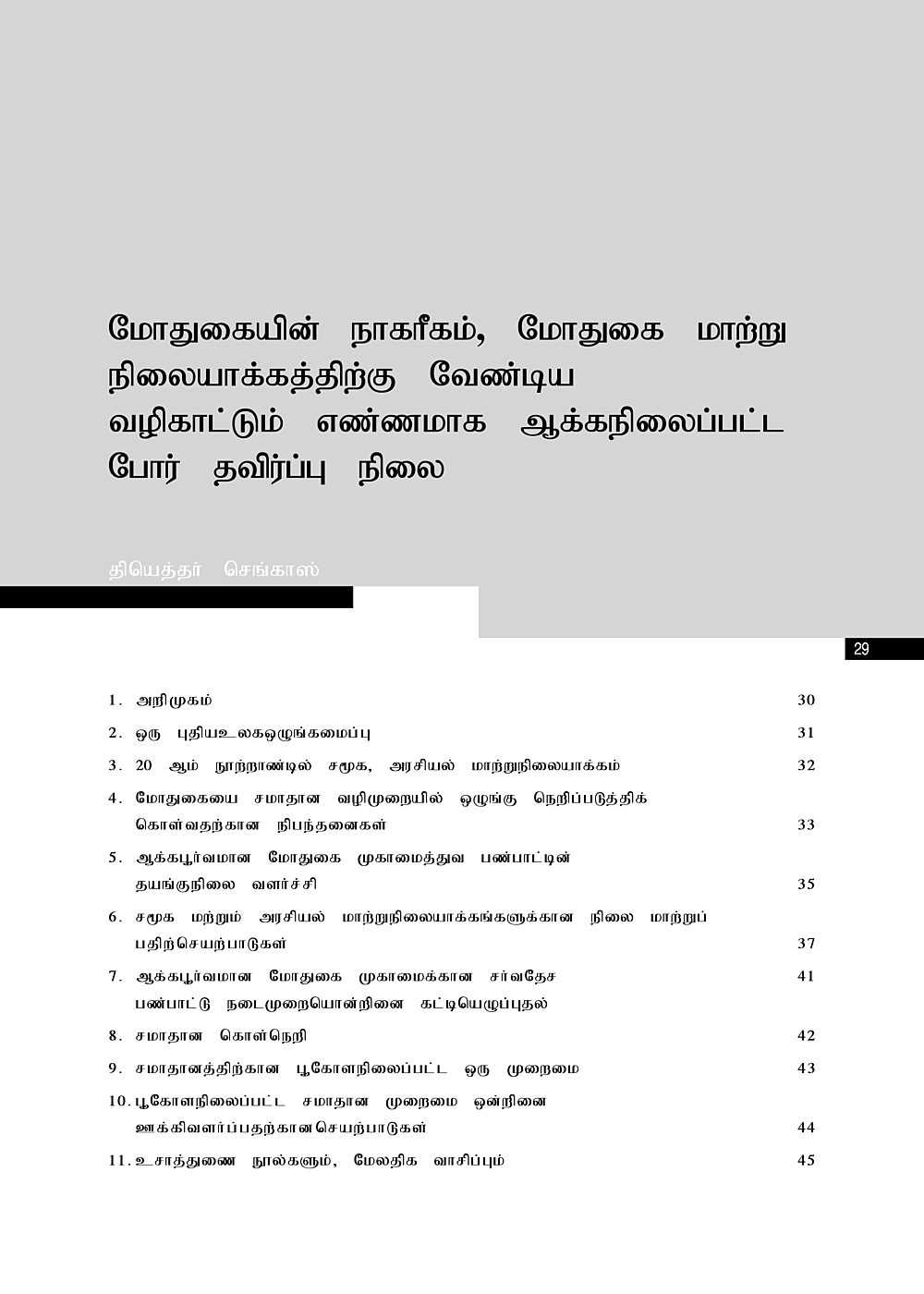
மோதுகையின் நாகரீகம், மோதுகை மாற்று நிலையாக்கத்திற்கு வேண்டிய வழிகாட்டும் எண்ணமாக ஆக்கநிலைப்பட்ட போர் தவிர்ப்பு நிலை.Handbook Article
[சுருக்கம் இயந்திரம்-மொழிபெயர்க்கப்பட்டுள்ளது] மோதல்களின் நாகரிக மேலாண்மை தொடர்பான தத்துவார்த்த கேள்விகளைப் பற்றி விவாதிக்கிறது. உள்நாட்டு அல்லது சர்வதேச யுத்தம் அராஜகத்தின் விளைவாக இருந்தால், அதை தேசிய, பிராந்திய மற்றும் சர்வதேச மட்டங்களில் கட்டமைக்கப்பட்ட ஒரு சமூக ஒழுங்கால் மட்டுமே தீர்க்க முடியும் என்று ஆசிரியர் முன்மொழிகிறார். ஆசிரியர் சிக்கலான அமைதி கட்டமைப்பின் மாதிரியை முன்வைக்கிறார், அதாவது "நாகரிக அறுகோணம்". (2004 அச்சு பதிப்பிற்காக திருத்தப்பட்டது)
- Year2007
- Author(s)Dieter Senghaas
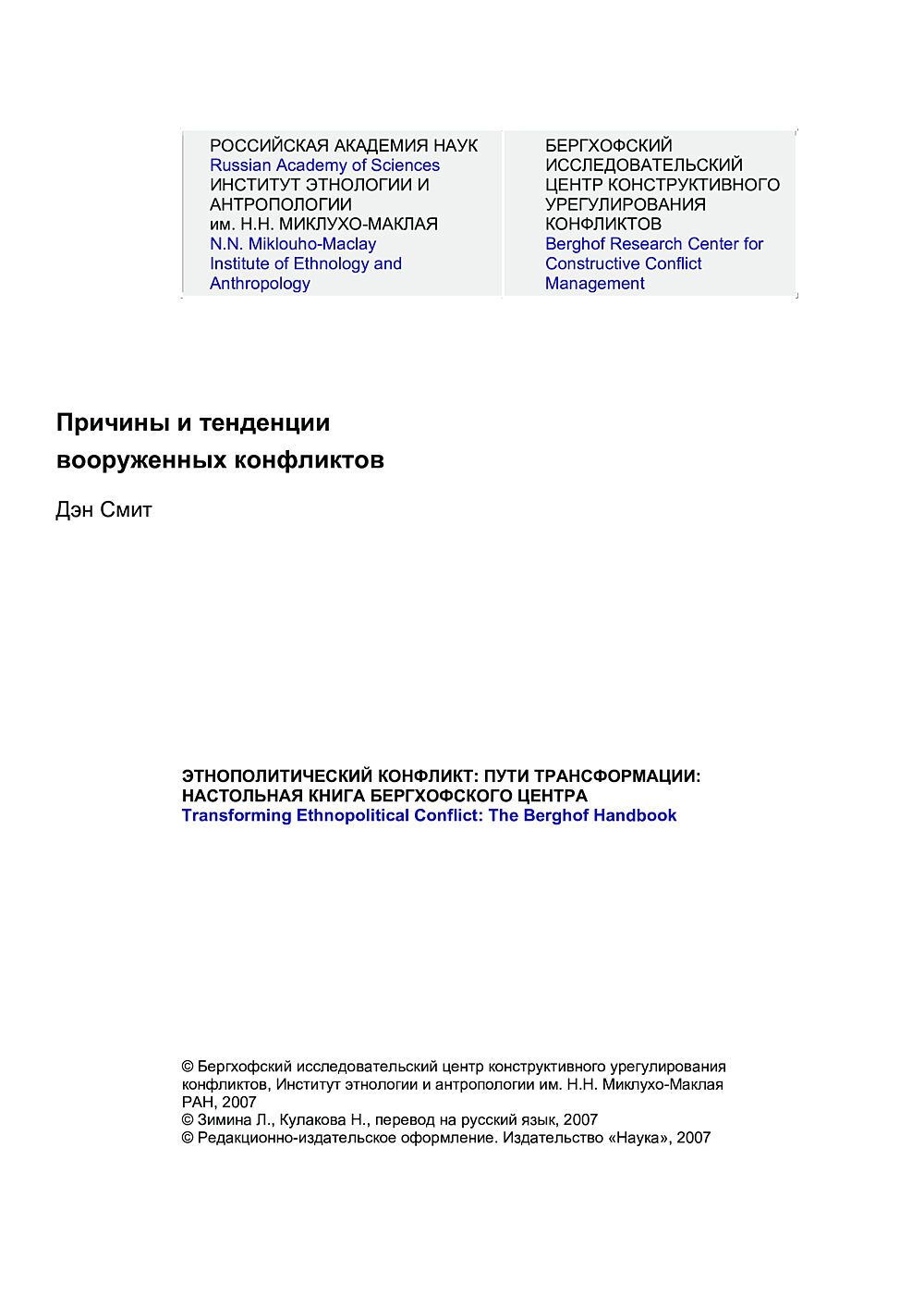
Причины и тенденции вооруженных конфликтовHandbook Article
[Аннотация машинный перевод] Дает обзор текущих результатов о причинах вооруженного конфликта, определяя несправедливость и мобилизацию в качестве ключевых понятий. Автор делится мнениями о том, где искать признаки потенциальной эскалации, где искать и как использовать возможности для предотвращения эскалации насилия. (переработано для печатного издания 2004 г.)
- Year2007
- Author(s)Dan Smith
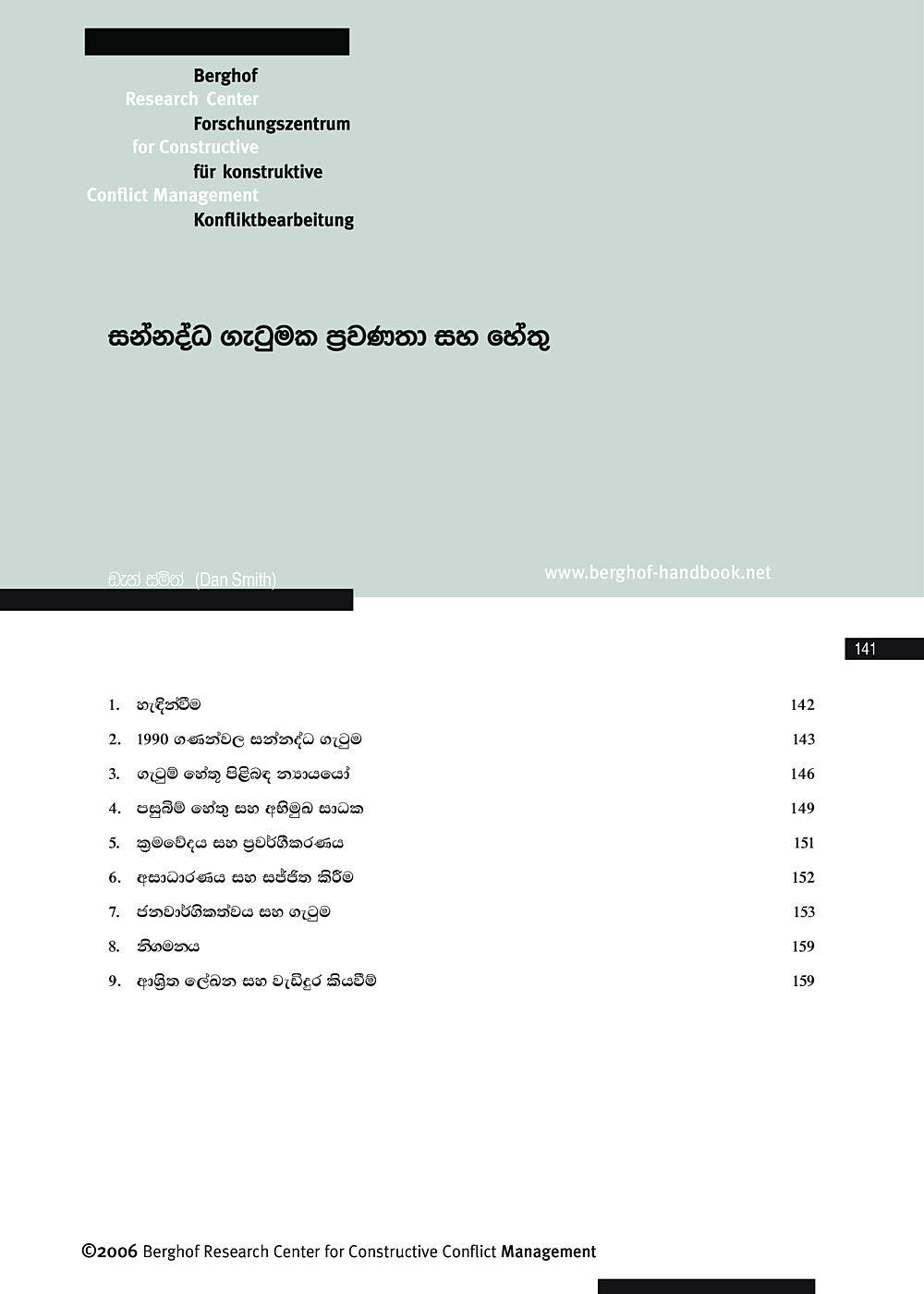
සන්නද්ධ ගැටුමක ප්රවණතා සහ හේතූHandbook Article
[වියුක්ත යන්ත්ර-පරිවර්තනය] සන්නද්ධ ගැටුම්, අයුක්තිය සහ බලමුලු ගැන්වීම් ප්රධාන සංකල්ප ලෙස හඳුනා ගැනීම පිළිබඳ වර්තමාන සොයාගැනීම් පිළිබඳ දළ විශ්ලේෂණයක් ලබා දෙයි. ප්රචණ්ඩකාරී උග්රවීම වැළැක්වීම සඳහා අවස්ථා සොයා ගත යුත්තේ කොතැනින්ද, කොතැනට යා යුතුද සහ අවස්ථාවන් ප්රයෝජනයට ගන්නේ කෙසේද යන්න පිළිබඳව කතුවරයා අවබෝධය බෙදා ගනී. (2004 මුද්රණ සංස්කරණය සඳහා සංශෝධනය කරන ලදි)
- Year2007
- Author(s)Dan Smith